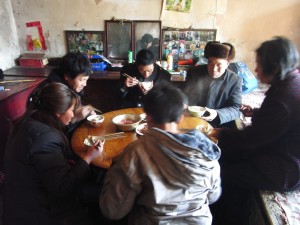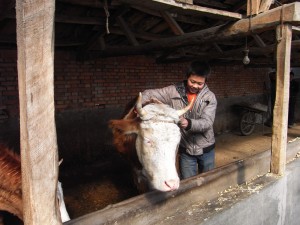We paid a visit to Wang Qinghua’s home earlier this year, and we saw that in the past three months, this family of Heifer China project participants has experienced some changes. Wang Qinghua bought a seven-seat van for purchasing goods and ingredients for her restaurant. Meanwhile, it was used to send water to the Daxigou forest farm twice each day.
The family got 21,000 Yuan (about US $3,300) in income through cattle rearing, about $470 in income from their vegetable plantation, about $2,200 through running the restaurant, and roughly $1,400 from their corn, potato, hazelnut and mushroom crops. This year the family has spent more than $860 on elders’ medical care, $1,500 on their son’s tuition and boarding fees and $315 on a computer.

Because of the success of the De'anzhuang Project, the television station in Weichang County broadcasted "Small Village, New Changes: Heifer Program in De'anzhuang" four times a day for two days in February in order to inform people about the big changes in this small village. Wang Qinghua, as one of the three project families, was interviewed by the journalists and appeared on the TV program. Other Heifer China self-help group members and Wang Qinghua also did participatory self-reviews and planning on project activities in 2011 and practiced their Yong Ko dance. They also received trainings on marketing, spring season cattle rearing technology and pole bean growing.
Wang Qinghua's son, Mao Huanhuan, experienced a significant winter vacation by doing lots of activities such as feeding cattle, washing clothes, playing basketball and playing Chinese chess while completing his assignments. Moreover, he helped collect a special kind of plant especially for urinary tract infection treatment to help a member of their village who is suffering from this condition.

As to community development, the community facilitator organized a discussion on exploring markets and enlarging the sales of vegetables. They finally reached an agreement to establish a cooperative, and Deli Vegetable Plantation Cooperative has been officially registered. 208 families in this village bought a share, and more than $28,000 in start up funds was raised. The construction of the road and the De’anzhuang middle bridge have been completed. There are also plans for a 1000 square meter vegetable trade market, a 220 square meter office and a fresh-preserved storehouse with the capacity of storing 60 tons of vegetables. This cooperative will focus on conducting the trade near their village. They also plan to install a street lamp, dig 15 wells, construct six small bridges and pilot a wind power project.
Editor’s note: This post is part of a series that follows the progress of specific families, starting at the beginning of their work with Heifer. Our team in China has chosen one family in each region where we work and is sharing quarterly updates as these families work to better their lives with Heifer’s help. You can read the first post about Wang Qinghua and her family here.